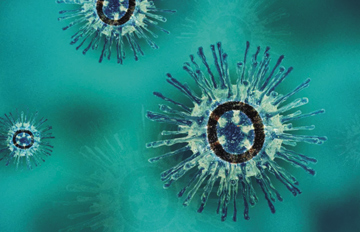![]()
Is This the Start of the Endemic Phase of Covid-19?
Errol Buntuyan, M.D., FAAFP
Moving into the Spring of 2022, there is quite a stark contrast from just 12 months ago. During the early months of 2021, the COVID vaccines were just beginning to be dispersed and many people were just starting to feel confident to get back into society. Folks from the mainland started to come for Spring Break vacation, eager to travel to escape into our tropical paradise. There were some early news circulating this time last year about a Delta variant spreading in India, and the horrors endured by that country with minimal access to vaccines and oxygen supplies.
Flash forward to today. The mask mandate was lifted and the Hawai‘i Safe Travels program was stopped at the end of March. Our COVID infectivity numbers have once again gone below five percent across all regions of Hawai‘i. Also, the number of hospitalizations as well as the death rates from COVID have dropped tremendously this past month.
A sense of freedom and normalcy is finally here. Some establishments (i.e. medical facilities, clinics) still require masks indoors and people are choosing to wear their masks in public places for continued protection against infection.
We have seen these lulls in infection rates, hospitalizations and deaths in the past two years only to have been met with brand new variants and surges. Will this lull be different and signal the start of the endemic phase of COVID?

We still press forward with our continued efforts to vaccinate with boosters and protect ourselves from COVID. The second mRNA booster has been approved by the FDA. Here are the recommendations below:
• A second booster dose of the Pfizer-BioNTech COVID-19 Vaccine or Moderna COVID-19 Vaccine may be administered to individuals 50 years of age and older at least four months after receipt of a first booster dose of any COVID-19 vaccine
• A second booster dose of the Pfizer-BioNTech COVID-19 Vaccine may be administered to individuals 12 years of age and older with certain kinds of immunocompromise at least four months after receipt of a first booster dose of any authorized or approved COVID-19 vaccine. These are people who have undergone solid organ transplantation or who are living with conditions considered to have an equivalent level of immunocompromise.
• A second booster dose of the Moderna COVID-19 Vaccine may be administered at least four months after the first booster dose of any authorized or approved COVID-19 vaccine to individuals 18 years of age and older with the same certain kinds of immunocompromise.
For those who had a primary series of Johnson and Johnson:
• Anyone 18 years or older who received a J&J/Janssen COVID-19 vaccine for both their primary dose and booster is recommended to get a second mRNA booster. At least two months must pass since the first J&J/Jansen booster.
• Adults 50 years and older who first received a J&J/Janssen COVID-19 vaccine, regardless of what type of booster they received, an mRNA (Pfizer or Moderna) is the only recommended vaccine for a second booster. At least four months must pass in between the mRNA boosters.
As with past lulls, experts are monitoring activity for any new infectivity trends throughout the world. There is news of a subvariant of Omicron, BA.2 causing a surge in cases in China and areas of Europe. The BA.2 subvariant of Omicron is already in the U.S. and in Hawai‘i but so far has not been causing widespread, severe illness as did past strains here in Hawai‘i. It presents with similar symptoms of Omicron which surged through our community in January and it is much more contagious than all the prior variants.
Symptoms: The typical BA.2 symptoms resemble the common cold or the flu. Here’s a breakdown of the most common:
• Runny nose
• Headache
• Fatigue
• Sneezing
• Sore throat
• Persistent cough
• Hoarse voice
• Chills or shivers
• Fever
• Dizziness
• Brain fog
• Muscle pains
• Loss of smell
• Chest pain
The spread of this highly infectious variant, however, has not yet translated into a rise in virus-related hospitalizations. This is likely attributable to the relatively high numbers of people who are already vaccinated. Also, many people have already been infected with Omicron in January and thus a level of natural immunity is helping to provide protection against infection.
We should expect a rise in cases in the next few weeks because of the lifting of mask mandates and the end of travel screenings into Hawai‘i. Due to the mild nature of illness we have seen thus far, however, the level of worry appears to be very low for many people. In essence, we are all tired of the regulations against COVID and very eager to get back to our normal lives.
Many would like this Spring to be the start of the endemic phase of COVID. In an endemic phase, we know the COVID virus is still circulating amongst our community. Due to the decreased severity of illness, however, we can manage the mild symptoms like we had in the past with the common cold or flu. Those without symptoms can go about our normal regular lives.
In an endemic phase, we should no longer have mask mandates nor have to follow the strict guidelines in most indoor establishments. We can exercise caution if we are around people with symptoms or have been infected with COVID. We should isolate ourselves if we develop symptoms of our own.
We should continue to be wise and prepared in the upcoming months. We should get the vaccine boosters recommended by the FDA and the CDC when we are eligible. We should also be aware of the latest COVID treatments and prevention medications if we fall in a high-risk group.
New treatments will continue to develop in the endemic phase. There are upcoming monoclonal antibody regimens more effective against Omicron and BA.2. The good news is these treatments on Maui can be obtained at Maui Memorial Medical Center. Information on COVID treatments, eligibility and registration forms are available on the Maui Health Systems website (https://www.mauihealth.org/).
Heading into the Spring and Summer of 2022 should feel quite different than last year. More people are now vaccinated or immune from getting COVID, we have more knowledge about medication for treatment and prevention and we are doing our best to have a healthy immune system by lifestyle modification.
Only time will tell if another variant comes after this lull. What we do know is we can only remain aware of the options that can protect us from COVID infection. Vaccines, masks and keeping our immune systems strong are the best strategies to give us hope and traction to finally move into the endemic phase.
 Errol Buntuyan, M.D. is a Family Medicine Practitioner and the Physician in Charge of Maui Primary Care at Kaiser Permanente. Born in Quezon City and raised in Southern California, he has been practicing medicine on Maui since 2007. Dr. Buntuyan promotes whole food, plant based nutrition, regular physical activity, stress mindfulness and sleep hygiene as keys to optimum health and wellness. He enjoys cooking, playing tennis and travel.
Errol Buntuyan, M.D. is a Family Medicine Practitioner and the Physician in Charge of Maui Primary Care at Kaiser Permanente. Born in Quezon City and raised in Southern California, he has been practicing medicine on Maui since 2007. Dr. Buntuyan promotes whole food, plant based nutrition, regular physical activity, stress mindfulness and sleep hygiene as keys to optimum health and wellness. He enjoys cooking, playing tennis and travel.
